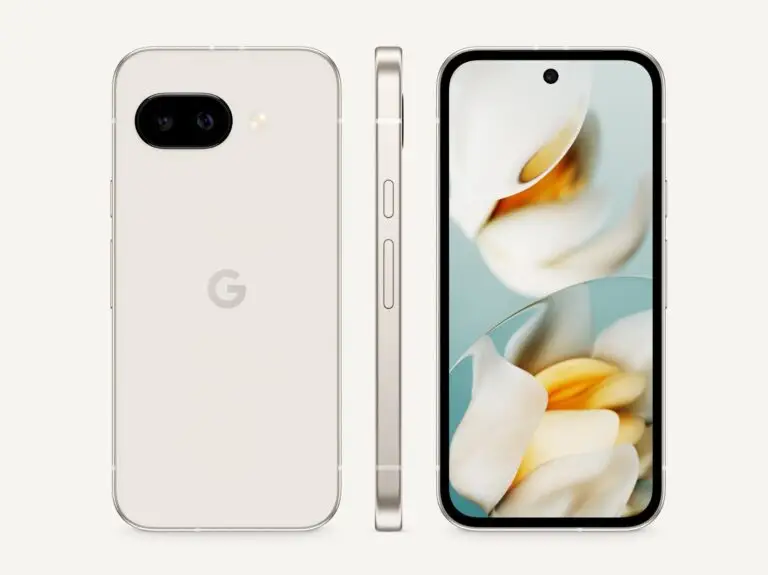Google Pixel 9a has finally arrived, offering a budget-friendly alternative to Apple’s upcoming iPhone 16E. While Google Pixel 9a is priced lower, it lacks some crucial features that Apple users take for granted. However, Google aims to bridge the gap with AI-based optimizations. But does AI really compensate for missing hardware features? Let’s dive in.
Table of Contents
Google Pixel 9a vs. iPhone 16E: Price Comparison
One of the biggest selling points of the Google Pixel 9a is its price. Historically, Google’s A-series phones have been among the most affordable mid-range Android options, and the Pixel 9a is no exception. On the other hand, Apple’s iPhone 16E is expected to be the cheapest in the iPhone 16 lineup but still costs significantly more than the Pixel 9a.
✅ Pixel 9a Expected Price: Around ₹37,000 – ₹42,000
✅ iPhone 16E Expected Price: Around ₹58,000 – ₹63,000
Clearly, the Pixel 9a offers better affordability, but is it really a better deal? Let’s explore the missing features.
Google Pixel 9a: What It Misses Compared to iPhone 16E
1. Premium Build Quality
The iPhone 16E is expected to feature a sturdy aluminum or even titanium frame, similar to its high-end counterparts. Meanwhile, the Pixel 9a may stick to a plastic or polycarbonate body, making it less premium in hand.
2. Performance: AI Optimization vs. Chipset Efficiency
Apple’s iPhone 16E will likely feature the A17 or A18 Bionic chip, delivering unmatched power efficiency and raw performance. Meanwhile, the Google Pixel 9a is expected to run on the Google Tensor G3, which, while optimized for AI, still lags behind Apple’s chipset in benchmark scores and efficiency.
- Apple’s Strength: The A-series chips are built on a cutting-edge process, offering better heat management, battery efficiency, and smoother performance for intensive tasks.
- Google’s Strength: Tensor G3 is designed for AI-based optimizations, meaning real-world tasks like voice processing, camera enhancements, and live translation might be faster than on the iPhone.
3. Camera Features & AI-Powered Optimization
Pixel phones have always excelled in photography, and the Google Pixel 9a continues this trend. However, it might lack features like LiDAR, ProRAW, and advanced night mode that Apple offers. Here’s how they compare:
| Feature | Google Pixel 9a | iPhone 16E |
|---|---|---|
| Night Sight | ✅ Best in class | ✅ Great but AI-dependent |
| Portrait Mode | ✅ AI-enhanced | ✅ LiDAR-assisted |
| Video Quality | ⚠️ 4K but lacks ProRes | ✅ ProRes, Dolby Vision |
| Zoom | ⚠️ Limited (No Telephoto) | ✅ Advanced Digital & Optical Zoom |
Google’s AI helps compensate for missing hardware, but Apple’s superior image processing and dedicated hardware (like LiDAR) offer a more consistent experience.
4. iOS vs. Android: Software Longevity & Ecosystem
Apple is known for providing long-term software updates, often supporting devices for 6-7 years. Meanwhile, Google’s Pixel series guarantees only 4-5 years of OS updates, which is still impressive for Android but falls short of Apple’s support.
Additionally, the Apple ecosystem provides seamless integration with Mac, iPad, AirPods, Apple Watch, and Apple TV, while Google’s ecosystem is still evolving.
5. Battery Life & Charging
Battery efficiency is another area where Apple dominates. iPhones have smaller batteries but last longer due to efficient chipsets and deep OS optimization. The Pixel 9a may pack a larger battery, but real-world endurance might not match up to the iPhone 16E’s battery life.
| Feature | Google Pixel 9a | iPhone 16E |
|---|---|---|
| Battery Life | ✅ Decent but AI-reliant | ✅ Efficient chipset boosts life |
| Fast Charging | ⚠️ Slower (likely 18-23W) | ✅ Faster (up to 30W) |
| Wireless Charging | ✅ Expected | ✅ MagSafe & Qi2 support |
Final Verdict: Should You Buy the Pixel 9a or iPhone 16E?
Buy Google Pixel 9a If:
✅ You want an affordable phone with AI-powered enhancements.
✅ You prioritize Google’s software features like Call Screening & Magic Eraser.
✅ You prefer Android and frequent software updates.
Buy iPhone 16E If:
✅ You want better long-term performance and iOS updates.
✅ You prefer premium hardware and seamless ecosystem integration.
✅ You need better video recording and pro-level camera features.
FAQs
1. Will the Pixel 9a support 5G in India?
Yes, Google is expected to include 5G support for Indian networks, but it may have fewer 5G bands than the iPhone 16E.
2. Does Pixel 9a have Face Unlock like iPhone 16E?
Pixel 9a is likely to include Face Unlock, but it will be software-based, whereas Apple’s Face ID is hardware-driven, making it more secure.
3. Can the Pixel 9a compete with iPhone 16E in gaming performance?
While Tensor G3 is optimized for AI, it may not match the raw gaming power of Apple’s A-series chips, which have superior GPU capabilities.
4. Will Google provide more software updates for the Pixel 9a?
Google has been improving its update policy, but iPhones still receive longer support, often lasting more than 6 years.
5. Which phone has a better resale value in India?
Apple iPhones generally hold their resale value better due to their brand loyalty and long-term software support, while Pixel devices depreciate faster.
Conclusion
The Pixel 9a may be cheaper than the iPhone 16E, but it makes trade-offs in build quality, chipset efficiency, and Apple’s premium ecosystem. However, Google’s AI optimizations make it a compelling option, particularly for those who value smart features over raw power. Ultimately, the choice depends on whether you prefer an AI-driven experience or a performance-first approach.
Sources:
- Google Official Blog (https://blog.google/)
- Apple Official Website (https://www.apple.com/)
- Tech Review Websites (GSM Arena, Android Authority, MacRumors)
What’s your pick? Let us know in the comments! 🚀


